
Iranians storm U.S. embassy on November 4, 1979
Iranians storm U.S. embassy: Student followers of the Ayatollah Khomeini send shock waves across America when they storm the U.S. embassy in Tehran. The radical Islamic fundamentalists took 90 hostages. The students were enraged that the deposed Shah had been allowed to enter the United States for medical treatment and they threatened to murder hostages if any rescue was attempted. Days later, Iran's provincial leader resigned, and the Ayatollah Khomeini, the leader of Iran's fundamentalist revolutionaries, took full control of the country—and the fate of the hostages.
Two weeks after the storming of the embassy, the Ayatollah began to release all non-U.S. captives, and all female and minority Americans, citing these groups as among the people oppressed by the United States government. The remaining 52 captives were left at the mercy of the Ayatollah for the next 14 months.
President Jimmy Carter was unable to diplomatically resolve the crisis, and on April 24, 1980, he ordered a disastrous rescue mission in which eight U.S. military personnel were killed and no hostages rescued. Three months later, the former shah died of cancer in Egypt, but the crisis continued. In November 1980, Carter lost the presidential election to Republican Ronald Reagan. Soon after, with the assistance of Algerian intermediaries, successful negotiations finally began between the United States and Iran.
On January 20, 1981—the day of Reagan's inauguration—the United States freed almost $3 billion in frozen Iranian assets and promised $5 billion more in financial aid. Minutes after Reagan was sworn in, the hostages flew out of Iran on an Algerian airliner, ending their 444-day ordeal. The next day, Jimmy Carter flew to West Germany to greet them on their way home.
History Channel / Wikipedia / Army.mil
Wikipedia Photo: The Iran hostage crisis was a diplomatic crisis between Iran and the United States where 52 Americans were held hostage for 444 days from November 4, 1979, to January 20, 1981, after a group of Islamist students and militants took over the American Embassy in Tehran in support of the Iranian Revolution. President Carter called the hostages “victims of terrorism and anarchy”, adding that the “United States will not yield to blackmail”. The hostages were formally released into United States custody the following day, just minutes after the new American president Ronald Reagan was sworn into office.
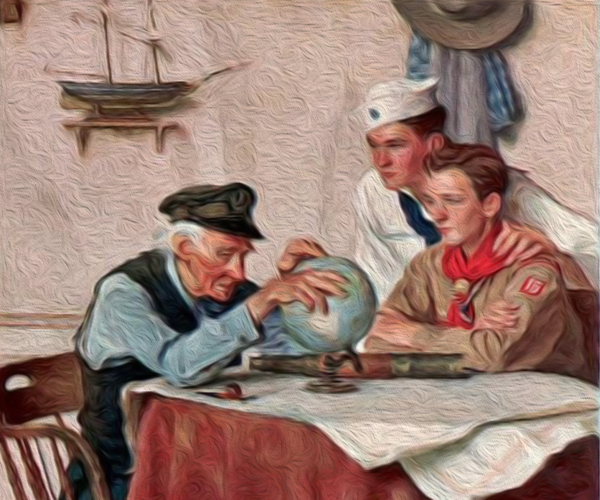
Understanding Military Terminology - feint
(DOD) Feint:
In military deception, an offensive action involving contact with the adversary conducted for the purpose of deceiving the adversary as to the location and/or time of the actual main offensive action. Wikipedia
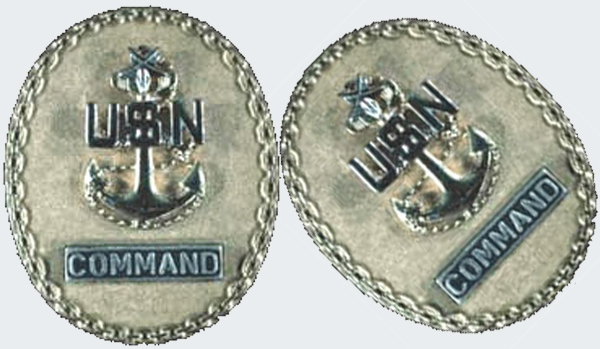
The Old Salt’s Corner
“The Chief of the Boat”
Here's to the sailor called COB - that stands for Chief of the Boat.
He's generally the oldest and smartest of all the old goats afloat.
There have been many like him down through the years, they have served on subs far and wide,
and when work parties are needed from him you cannot hide.
He's the senior Chief on board the boat, on him the officers rely, if they can't get something done real quick to him they run and cry.
This makes him mad that they have to do this, to them he says, “Aye, Aye”.
He heads for the trouble spot, he yells, snarls and bellows
and after a minute of this all you see is navy asses and elbows.
He don't take no guff, no crap, or back talk, you better do as your told,
he don't like his sailors to be cocky, surly or bold.
It only takes once to cross the COB
and you will never see a sorrier gob
But if you do the best that you can and give your all to the boat,
why he can be the nicest old guy you ever met afloat.
Without them who knows what would happen, Chiefs are vital to the Navy it's true,
but the smartest and best have taken the test and on submarines they do crew.
So here's to the COB, he ain't pretty, but he knows a lot more than most and if you pay attention to him, someday you'll be able to boast, I learned it all from this old Chief, way back in '53;
He was called the Chief of the Boat, but he was like a God to me.
So get yourselves to working and we'll make our boat the best,
I've got to walk this non-qual through and give him a final test.
For I have made the grade you see, I'm the Senior Chief afloat,
and my chest swells with a lot of pride for I am now Chief of the Boat. THE END
Dedicated to all COBs past and future, thanks for helping a stupid kid become a man.

“I’m Just Sayin’”
If the plural of octopus is octopi and platypus is platypi what is the plural of schoolbus?

“Thought for the Day”
“Just because your voice reaches halfway around the world doesn't mean you are wiser than when it reached only to the end of the bar.”
~ Edward R. Murrow

“What I Have Learned”
Experience is knowledge acquired too late.
~ Anonymous

Bizarre News (we couldn’t make up stuff this good – real news story)

BOURNE, Massachusetts - Police in Massachusetts said a woman arrested on narcotics charges was hiding heroin and oxycodone pills inside a buttocks prosthesis.
The Bourne Police Department said Jill Roy, 33, was pulled over in Buzzards Bay Sept. 16, and she was arrested when a bag containing various pills fell from the leg of her pants while she was standing near a patrol car. Roy also admitted ownership of a bag containing 1 ounce of marijuana in the car, police said. Investigators said a passenger in the car, Jennifer Johnson, 32, was arrested on multiple outstanding warrants.
The arrest report said Roy was examined by Officer Nicole Bevilacqua at the station, and the officer “observed [the suspect's] underwear have a hard exterior”. The report said Roy explained the hard exterior was a buttocks prosthesis intended for aesthetic purposes. “I don't have a butt so I wear these and another pair of underwear under it”, Roy was quoted as saying.
Roy was made to remove the hard-backed underwear and Bevilacqua discovered a “large bulge” in the lower pair of underwear contained two plastic baggies containing $350 worth of heroin and 13 Oxycodone pills.
Roy was held on felony and misdemeanor narcotics charges. UPI (United Press International)
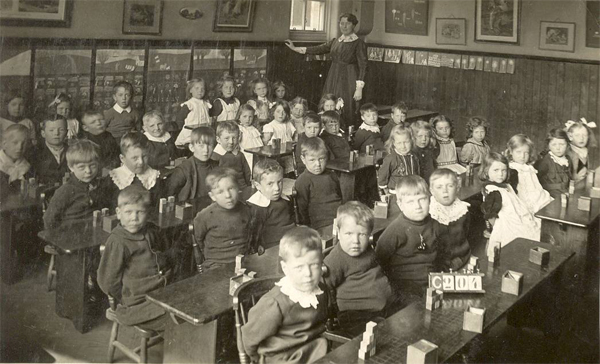
Mr. Answer Man Please Tell Us: Why Do Students Get Summers Off From School?
It’s commonly believed that school kids started taking summers off in the 19th century so they’d have time to work on the farm. Nice as that story is, it isn’t true. Summer vacation has little to do with tilling fields and more to do with sweaty, rich city kids playing hooky and their sweaty, rich parents.
Before the Civil War, farm kids never had summers off. They went to school during the hottest and coldest months and stayed home during the spring and fall, when crops needed to be planted and harvested. Meanwhile, city kids hit the books all year long—summers included. In 1842, Detroit’s academic year lasted 260 days!
But as cities got denser, they got hotter. Endless lanes of brick and concrete transformed urban blocks into kilns, thanks to the “urban heat island effect”. That’s when America’s swelling middle and upper class families started hightailing it to the cooler countryside. And that caused a problem. School attendance wasn’t mandatory back then, and classrooms were being left half-empty each summer. Something had to give.
Legislators, in one of those if-you-can’t-beat-‘em-join-‘em moments, started arguing that kids should get summers off anyway. It helped that, culturally, leisure time was becoming more important. With the dawn of labor unions and the eight-hour workday, working adults were getting more time to themselves than ever before. Advocates for vacation time also argued (incorrectly) that the brain was a muscle, and like any muscle, it could suffer injuries if overused. From there, they argued that students shouldn’t go to school year-round because it could strain their brains. To top it off, air conditioning was decades away, and city schools during summertime were miserable, half-empty ovens
So by the turn of the century, urban districts had managed to cut about 60 schooldays from the most sweltering part of the year. Rural schools soon adopted the same pattern so they wouldn’t fall behind. Business folks obviously saw an opportunity here. The summer vacation biz soon ballooned into what is now one of the country’s largest billion-dollar industries.
Wikipedia Photo: Old School Classroom
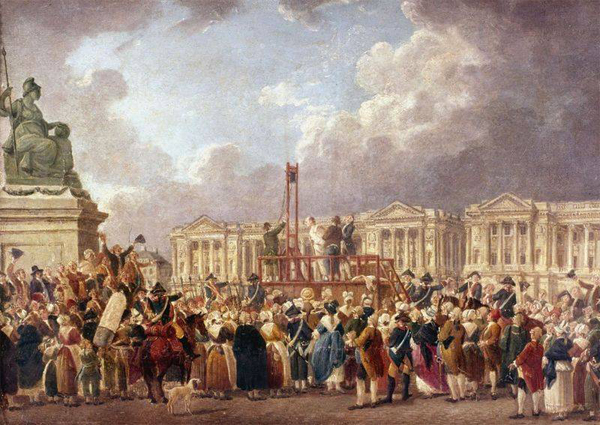
Where Did That Saying Come From?
“Going to Hell in a Handbasket:”
When a person is “Going to Hell in a Hand Basket” that person is in a heap o’ trouble, on a slippery slope, circling the drain and on the road to perdition.
The phrase comes from the French Revolution in which the heads of the aristocrats rolled or popped off the Guillotine and were then transported in baskets. Since they were criminals they were Hell-bound, and so were off to “ Hell in a hand basket.” World Wide Words
Wikipedia Image: French Revolution An Execution, Place De La Revolution, Between August 1793 and June 1794 by Pierre Antoine De Machy
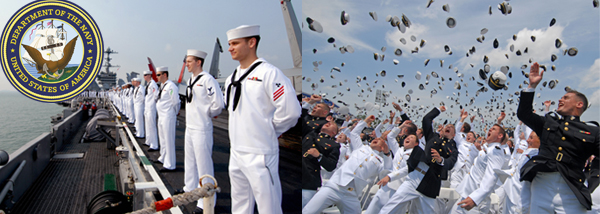
NAVSPEAK aka U.S. Navy Slang
B.O.H.I.C.A.: “Bend Over, Here It Comes Again.”
Bolter: Failed attempt at an arrested landing on a carrier by a fixed-wing aircraft. Usually caused by a poor approach or a hook bounce on the deck, this embarrassing event leads to a go-around and another attempt to “board”.
Bonnie Dick: Nickname for USS Bonhomme Richard (LHD-6)
Bone Me Hard Richard: Another nickname for the USS “Bonhomme Richard” (LHD-6). This name originates from Great Lakes, Illinois and generally refers to the primarily female barracks of the same name.
Boomer Fag: Any Naval personnel that serves aboard a Boomer.
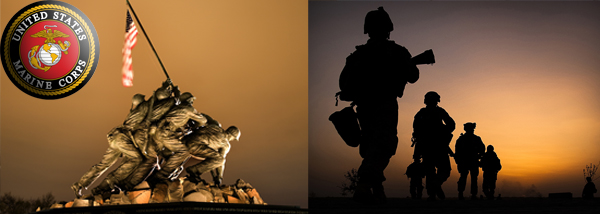
Just for you MARINE
Code Talkers: Navajo Marines who were recruited during World War II to serve as field radio operators. They would take the orders of the various commanders and translate them into Navajo and sending the information to another Code Talker who would translate it back into English. It is the only field code never broken by the Japanese.
Colonel: The sixth grade of commissioned officer and senior field grade officer indicated by a silver eagle (always facing forward) on the collar of the uniform. Air Force and Marine colonels wear two eagles while Army colonels wear the eagle only on the left collar while the insignia of their branch of service is worn on the other. The pay grade is O-6 and in the Navy and Coast Guard the rank is captain.
Color Sergeant By regulation the most senior sergeant (E-5) in the Marine Corps. He or she is assigned to 8th and Eye and has charge of the official colors of the Marine Corps.

Navy Acronyms
DOD - Department of Defense
Federal department in charge of organizing and supervising all agencies related directly to national defense, specifically the Armed Forces.
DON - Department of the Navy
Department established by Congress to provide support and leadership to the U.S. Navy.
DT - Dental Technician
Enlisted Sailor tasked with assisting Navy Dentists in providing dental care to Navy personnel and their families.

Naval Aviation Squadron Nicknames
VP-26 - Patrol Squadron 26: “Tridents” NAS Brunswick, Maine

The Strange, Mysterious or Downright Weird
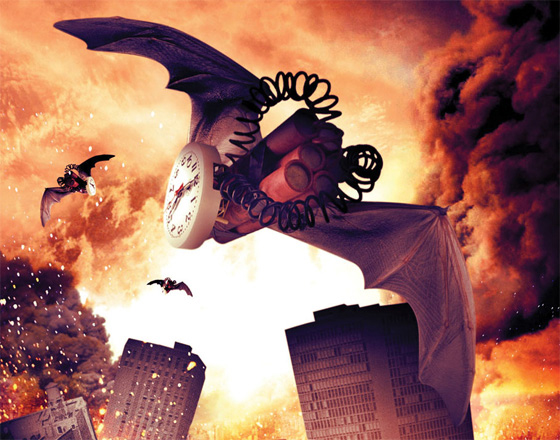
During World War II, an oral surgeon named Lytle Adams contacted the White House with a novel idea. Bats could be the Allies’ new secret weapons!
Troops could strap little bombs to bats, airdrop them into Axis strongholds, and watch the destruction from a safe distance. Strangely, the idea isn’t as crazy as it sounds. Bats can carry more than their own weight in flight. They’re also plentiful and cheap; four caves in Texas alone housed millions of the critters.
Franklin Roosevelt was enamored of the concept, and in 1942, he greenlit the project. He also convinced Adams to abandon dentistry to pitch in with the effort. By 1943, Adams and the Army had recruited thousands of Mexican free-tailed bats for the job, while Louis Fieser, the inventor of napalm, designed their one-ounce detonating packs. According to plans, a carrier with 26 stacked trays—each containing 40 little bat homes—would parachute into the industrial cities of Japan’s Osaka Bay. The bats would then fly off and wedge themselves into the nooks and crannies of buildings to sleep off their jet lag—at least until a timer detonated their packs.
Only the bats never got to carry out their kamikaze-style mission. During one test run in Carlsbad, New Mexico, the bats got loose, roosted under a fuel tank, and incinerated the facility. Fed up with bats, the Army handed the hot potato project to the Navy, which foisted it on the Marines. Eventually, the Marines pulled off a successful test on a mock Japanese village in Utah.
Good news for bats, though: In the time it had taken to perfect the bat explosives, the military had designed a slightly more efficient and predictable weapon: the atomic bomb.The Atlantic / Mental Floss / Wikipedia

The Old Sailors Almanac is proud to introduce a new feature - original cartoons by Marty Gavin. Marty’s cartoons will appear weekly in the Old Sailors Almanac and oldsailorsalmanac.com. In case you miss and issue there will also be an archive on the website containing all his cartoons.

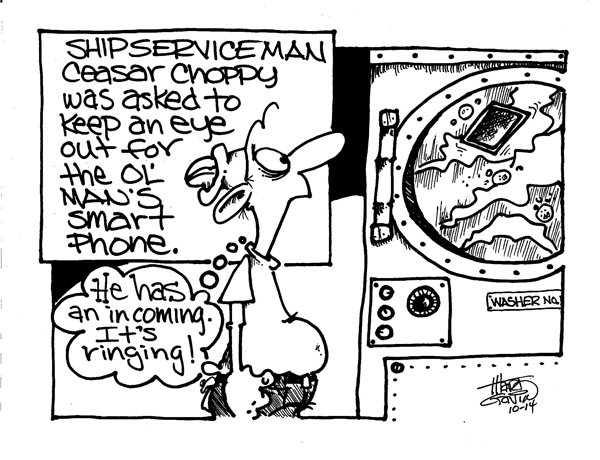
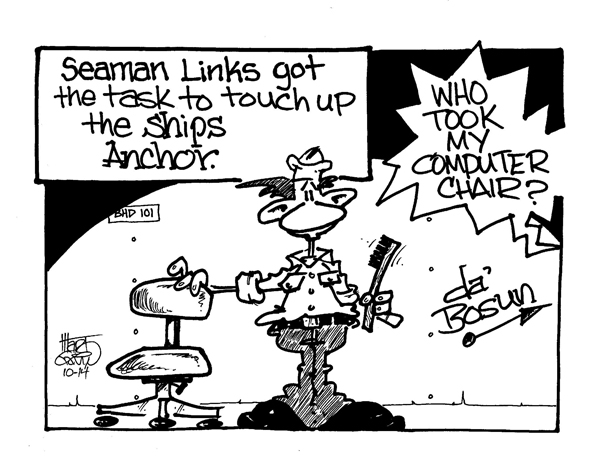
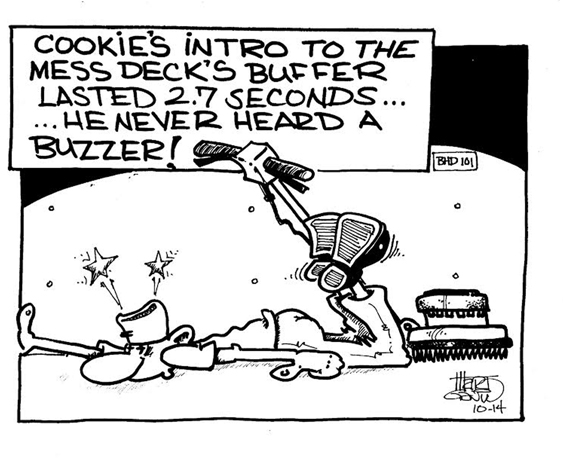
SONG FACTS

“Hotel California” - The Eagles
Released 1976 
Written by Don Felder, Glenn Frey and Don Henley, this song is about materialism and excess. California is used as the setting, but it could relate to anywhere in America. Don Henley in the London Daily Mail November 9, 2007 said: “Some of the wilder interpretations of that song have been amazing. It was really about the excesses of American culture and certain girls we knew. But it was also about the uneasy balance between art and commerce.”
On November 25, 2007 Henley appeared on the TV news show 60 Minutes, where he was told, “everyone wants to know what this song means”. Henley replied: “I know, it's so boring. It's a song about the dark underbelly of the American Dream, and about excess in America which was something we knew about.”
He offered yet another interpretation in the 2013 History of the Eagles documentary: “It's a song about a journey from innocence to experience.”
Song Facts / Wikipedia / Q105 CBS Local Tampa Florida
Image: Hotel California – The Eagles – 1977: The title track of one of the highest selling albums of all time, The Eagles’ Hotel California was a #1 single in the U.S. in May 1977.

Trivia
● “Poached egg” means “egg-in-a-bag”, from the French word poche. When an egg is poached, the white of the egg forms a pocket around the yolk; hence, the name.
● The “spring up, fall out” phenomenon says children grow twice as fast in the spring as they do in the fall, while they gain more weight in the fall.
● The Spanish flu, misnamed since it likely originated in the United States, was unlike most flu viruses, as it hit the young and healthy hardest. The pandemic killed 20 million to 40 million people in 1918. Comparatively, about 13 million died in the battles of World War I.
A Test for People Who Know Everything
In trucking circles, what do truckers call a tailgater who is following another vehicle too closely?
● Answer for People Who Do Not Know Everything, or Want to Verify Their AnswerTruck drivers money saving tips
Answer to Last Week's Test
What U.S. President was once arrested during his term of office, convicted of the crime and paid a fine?
Answer: President Ulysses S. Grant.was convicted of exceeding the Washington speed limit on his horse and was fined $20.
Joke of the Day
Little Johnny was starting his first day at a new school and his father called the teacher to tell her that little Johnny was a big gambler. She said that it was no problem and she has seen worse than that.
After Little Johnny’s first day at his new school his father called the teacher to see how it went. She said, “I think I broke his gambling.” The father asked how and she said, “He bet me $5.00 that I had a mole on my butt, so I pulled down my pants and won his money.”
“DAMN!” said the father. “What’s wrong?”, the teacher asked.
Little Johnny’s father said, “This morning he bet me $100.00 he would see his teacher’s butt before the day was over!”
























